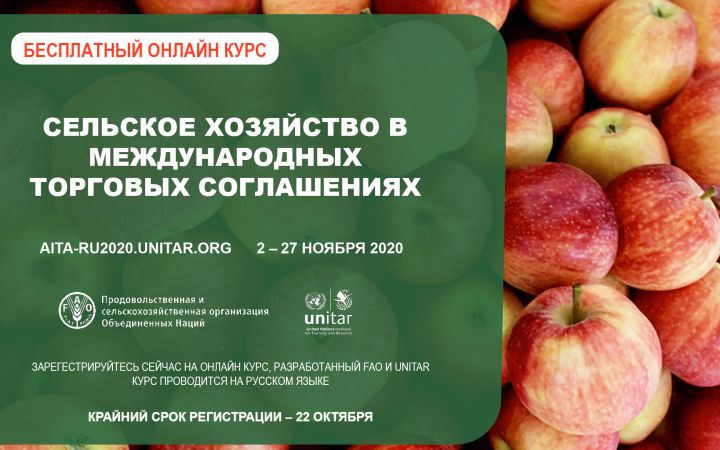Global trade in agricultural products has grown almost three-fold in value terms over the past decade with some regions increasing net exports and others increasing net imports. Considering the importance of food imports for food security and the role of exports in generating incomes, trade constitutes an essential component of most countries’ development strategies, including the post-Soviet countries. Recent changes in policies to regulate agrifood trade and to support agribusiness in relation with COVID-19 pandemic will be discussed at the course discussion forum.
Against this backdrop, this course is designed to assist professionals from ministries of agriculture, ministries of economy and other government and related authorities, who are directly involved in the formulation and implementation of trade or agricultural policies in the post-Soviet countries. Participants from the private sector and academia can also benefit from the course.
This 4-week Expert-facilitated online course aims to increase the participants' knowledge in understanding the international regulatory frameworks governing trade and its implementation mechanism as well as the eventual implications of recent WTO Ministerial Conferences; discuss the significance of non-tariff measures (NTMs) on the international trade and the relevance of WTO Agreements regarding such measures on the national trade policies; and learn about the main obligations on agriculture that the post-Soviet countries undertake upon accession to the WTO and within the framework of regional trade agreements.
In the preparation of this course, FAO draws from its extensive experience with providing guidance, capacity building and technical advice to its member countries on the topic of agricultural trade policy and multilateral trade negotiations, as well as its normative work in the framework of international conventions and agreements on SPS.
Register Now, Limited Slots are Available, 22 October 2020 Registration Deadline
This course is free of charge and will take place online from November 2 to 27, 2020. The course will be organized in three units and conducted in Russian language over a period of four weeks using the UNITAR’s e-learning platform.
Limited slots are available and will be subject to a selection process conducted by FAO and UNITAR, taking into account in particular, the geographical and institutional distribution as well as gender balance.
Priority will be given to policy makers and practitioners who impact agricultural trade, and professionals who are able to convey information and provide technical advice to their constituencies. Officials from Armenia, Azerbaijan, Belarus, Georgia, Kazakhstan, Kyrgyz Republic, the Republic of Moldova, the Russian Federation, Tajikistan, Ukraine and Uzbekistan are encouraged to apply.
A certificate of completion will be issued to participants who successfully complete all course-related assignments and assessments.
For more information and online registration, please visit UNITAR’s website at: http://aita-ru2020.unitar.org. Registration deadline is 22 October 2020.
Over the past seven years, UNITAR’s collaboration with FAO has continued to grow with over a dozen of agriculture and trade-related courses developed and delivered for the benefit of over 1,000 beneficiaries globally with a large part coming from Africa and Central Asia.
Comments from previous participants
The organizers received numerous positive comments from previous participants. 98% of the previous participants indicated that they were totally or mostly satisfied with the course and 100% of them specified that they would recommend the course to colleagues. Below are a few selected comments.
I would like to highlight that the course was very well-structured, carefully developed course and supplemented by important references. The fact that the mentors were constantly sharing additional references and links during the whole learning process has a very positive impact and assisted a deeper understanding of the topics.
I really liked the format of live communication with mentors, possibility to familiarize myself with competent opinions of colleagues on the current issues at their country level. Participants’ and mentors’ comments and feedbacks on practical issues and cases gave me a more detailed understanding and allowed me to see the bigger picture.
Participant from the Republic of Belarus
Participation in this training program was a pleasant surprise. It is been a long time since I studied so hard with so much pleasure. I can say that such a course is extremely valuable in all senses (education quality, interactivity, active participation of mentors in discussions).
As a business community representative, I can compare this online course to a Master of Business Administration (MBA) programs in Kyiv. The amount of knowledge gained from these two training programs is equal, even if your course is free of charge and lasted 4 weeks, while the MBA usually takes around 18 months and costs at least USD 10,000.
Participant from Ukraine
This was my second experience with online courses. The FAO-UNITAR course convinced me once again of the effectiveness of such training programs.
All training materials were presented in a good form, it was easy to read and digest. Intermediate tests of Modules 1 and 2 were very encouraging, of course when you give the correct answers. These tests helped to consolidate the knowledge that I had read before. In general, the course was very effective, interesting, useful and of high-quality.
Participant from the Republic of Uzbekistan
About FAO
FAO is a specialized agency of the United Nations that leads international efforts to defeat hunger. The goal is to achieve food security for all and make sure that people have regular access to enough high-quality food to lead active and healthy lives. With over 194-member states, FAO works in over 130 countries worldwide. For more information, visit www.fao.org


